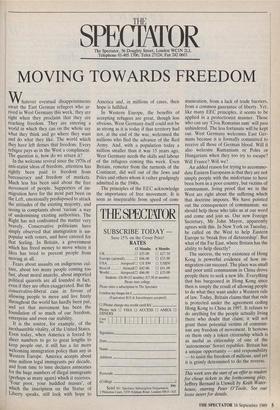SPE CTAT THE OR
The Spectator, 56 Doughty Street, London WC1N 2LL Telephone 01-405 1706; Telex 27124; Fax 242 0603
MOVING TOWARDS FREEDOM
Whatever eventual disappointments await the East German refugees who ar- rived in West Germany this week, they are right when they proclaim that they are reaching freedom. They are entering a world in which they can on the whole say what they think and go where they want and do what they like. The world which they have left denies that freedom. Every refugee pays us in the West a compliment. The question is, how do we return it?
In the welcome revival since the 1970s of anti-statist ideas of freedom, attention has rightly been paid to freedom from bureaucracy and freedom of markets. Much less has been said about the free movement of people. Supporters of im- migration have for the most part been on the Left, emotionally predisposed to attack the attitudes of the existing majority, and seeing in complaints about 'racism' a way of undermining existing authorities. The Right has not confronted the matter very bravely. Conservative politicians have simply observed that immigration is un- popular with voters, and have catered for that feeling. In Britain, a government which has freed money to move where it likes has tried to prevent people from moving at all.
Fears about assaults on indigenous cul- ture, about too many people coming too fast, about moral anarchy, about imported Political quarrels are all founded in fact, even if they are often exaggerated. But the conservative-liberal case in favour of allowing people to move and live freely throughout the world has hardly been put, and yet that movement has been the foundation of so much of our freedom, enterprise and even our stability.
It is the source, for example, of the inexhaustible vitality, of the United States. Even today, when America is forced by sheer numbers to go to great lengths to keep people out, it still has a far more welcoming immigration policy than any in Western Europe. America accepts about nine million legal immigrants per decade, and from time to time declares amnesties for the huge numbers of illegal immigrants (perhaps as many again) which it receives. Your poor, your huddled masses', of Which the inscription on the Statue of Liberty speaks, still look with hope to America and, in millions of cases, their hope is fulfilled.
In Western Europe, the benefits of accepting refugees are great, though less obvious. West Germany itself could not be as strong as it is today if that territory had not, at the end of the war, welcomed the millions who fled the advance of the Red Army. And, with a population today a million smaller than it was 15 years ago, West Germany needs the skills and labour of the refugees coming this week. Even Britain, remoter from the turmoils of the Continent, did well out of the Jews and Poles and others whom it rather grudgingly admitted in the 1940s.
The principles of the EEC acknowledge the importance of free movement. It is seen as inseparable from speed of corn munication, from a lack of trade barriers, from a common guarantee of liberty. Yet, like many EEC principles, it seems to be applied in a protectionist manner. Those who can say `Civis Romanus sum' will pass unhindered. The less fortunate will be kept out. West Germany welcomes East Ger- mans because it is formally committed to receive all those of German blood. Will it also welcome Rumanians or Poles or Hungarians when they too try to escape? Will France? Will we?
An added reason for trying to accommo- date Eastern Europeans is that they are not simply people with the misfortune to have been born in a poor country, but victims of communism, living proof that we in the West are right about the suffering which that doctrine imposes. We have pointed out the consequences of communism: we should help those who take us at our word and come and join us. Our new Foreign Secretary, Mr John Mayor, apparently agrees with this. In New York on Tuesday, he called on the West to help Eastern Europe to 'break free of dictatorship'. But what of the Far East, where Britain has the ability to help directly?
The success, the very existence of Hong Kong is powerful evidence of how im- migration can succeed. The place was small and poor until communism in China drove people there to seek a new life. Everything that has burgeoned in Hong Kong since then is simply the result of allowing people to do what they want under a Western rule of law. Today, Britain claims that that rule is protected under the agreement ceding Hong Kong to China in 1997. It refuses to do anything for the people actually living there who doubt that claim; it will not grant these potential victims of commun- ism any freedom of movement. It bestows on them only a token citizenship which is as useful as citizenship of one of the 'autonomous' Soviet republics. Britain has a unique opportunity — and responsibility — to assist the freedom of millions, and yet it is grimly determined to do the reverse.


































































 Previous page
Previous page